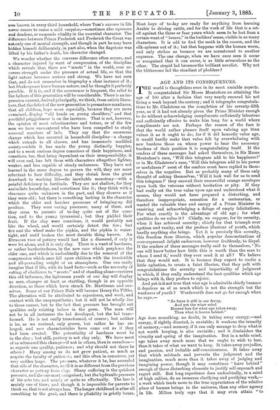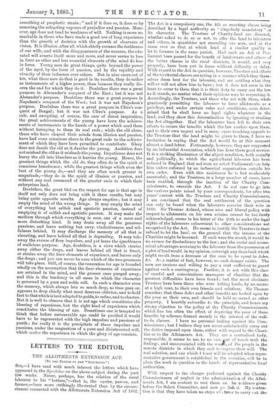AGE AND ITS CONSEQUENCES.
THE world is thoughtless even in its most amiable aspects. It congratulated Sir Moses Montefiore on attaining the age of 100 after a fashion that very nearly ensured his not living a week beyond the century; and it telegraphs congratulations to Mr. Gladstone on the completion of his seventy-fifth year, as if it had not already given the Prime Minister enough to do without acknowledging compliments sufficiently laborious and sufficiently effusive to make him long for a world where compliments are not. Perhaps the reason of the fuss is that the world rather plumes itself upon valuing age than values it as it ought to do; for if it did honestly value age, it would hardly make that value felt by overwhelming with new burdens those on whose power to bear the necessary burdens of their position it is congratulating itself. If the senders of these messages had asked themselves, in Sir Moses Montefiore's case, Will this telegram add to his happiness ?' or in Mr. Gladstone's case, Will this telegram add to his power or usefulness ?' most of the senders must have replied to themselves in the negative. But as probably many of them only thought of asking themselves, ' Will it look well for us to send this telegram ?' they snowed their unmerciful orange envelopes upon both the veterans without hesitation or pity. If they had really set the true value upon age and understood what it means, they would not have prepared a disturbing, and therefore inappropriate, sensation for a centenarian, or wasted the valuable time and energy of a Prime Minister in receiving and acknowledging a deluge of empty felicitations. For what exactly is the advantage of old age ; for what qualities do we value it F Chiefly, we suppose, for its serenity, when it has achieved serenity; chiefly for that triumph over egotism and vanity, and the profuse illusions of youth, which hardly anything else brings. Yet it is precisely this serenity, this freedom from illusion, which popular demonstrations of over-expressed delight endeavour, however fruitlessly, to dispel. If the senders of these messages really said to themselves, `No one will knowlsetter how little this is worth than the man to whom I send it,' would they ever send it at all ? We believe that they would not. It is because they expect to excite a little agitation, to create a faint illusion, that they pelt with congratulations the serenity and impartiality of judgment in which, if they really understand the best qualities which age brings with it, they profess to rejoice.
And yet is it not true that wise age is admirable chiefly because it deprives us of so much which is not the strength but the weakness of youth ? Wordsworth does not go far enough when he says,— " So fares it still in our decay, And yet the wiser wind
Mourns less for what age takes away, Than what it leaves behind?'
Age does something, no doubt, in taking away energy,—and energy, if rightly directed, is enviable; it weakens the tenacity of memory,—and memory, if it can only manage to drop what is not worth keeping, is also enviable ; and it diminishes the vivacity and spring of the imagination. But in a noble mind, age takes away much more that we ought to wish to lose, than it takes of what we want to keep. It takes away prejudice, and passion, and irritable self-consciousness. It takes away that which misleads and perverts the judgment and the imagination, much more than it takes away of judging and imagining power, though it may sometimes " leave behind " enough of these disturbing elements to justify self-reproach and regret still. Bat long experience does undoubtedly, in a mind of high calibre, do an immense clarifying and purifying work,— a work which tends more to the true appreciation of the relative place of human beings in the universe, than any other agency in life. Milton truly says that it may even attain " to something of prophetic strain ; " and if it does so, it does so by removing the refracting vapours of prejudice and passion. Moreover, age does not tend to weakness of will. Nothing is more remarkable in those who have made a good use of long experience than the growth of decision with the growth of clearness of vision. It is illusion, after all, which chiefly excuses the feebleness of our wills, and with the disappearance of the excuses, the educated will asserts itself more and more, and never seems to lose in force as other and less essential elements of the mind do lose in force. Young men do great things, quite beyond the power of the aged, by the force of passion, and by the rapidity and vivacity of their influence over others. But in nine cases out of ten, what these men do that is good in its results, they do rather as instruments of a higher power, than because they really discern the end for which they do it. Doubtless there was a great purpose in Alexander's conquest of the East ; but it was not Alexander's purpose. Doubtless there was a great purpose in Napoleon's conquest of the West; but it was not Napoleon's purpose. Doubtless there was a great purpose in Clive's conquest of Bengal ; but it was not Clive's purpose. As a rule, and excepting, of course, the case of direct inspiration, the great achievements of the young have been the achievements of instruments in the hands of a power which used them without betraying to them its real ends ; while the old alone, those who have cleared their minds from illusion and passion, have had some conscious share in the great ends to the achievement of which they have been permitted to contribute. Glory does not dazzle the old as it dazzles the young. Ambition does not mislead the old as it misleads the young. Impatience does not hurry the old into blunders as it hurries the young. Hence, the greatest things which the old do, they often do in the spirit of conscious beneficence; while the greatest things which even the best of the young do,—and they are often much greater in magnitude,—they do in the spirit of illusion or passion, and without any real command of the greater ends to which their enterprises lead.
Doubtless, the great blot on the respect for age is that age in itself not only does not bring with it these results, but may bring quite opposite results. Age always empties ; but it may empty the mind of the wrong things. It may empty the mind of everything but selfish and egotistic passion, instead of emptying it of selfish and egotistic passion. It may make the medium through which everything is seen, one of a more and more disturbing kind. It may drain away all the generous passions, and leave nothing but envy, vindictiveness, and wilfulness behind. It may discharge the memory of all that is elevating, and leave behind all that is degrading. It may take away the excuse of fiery impulses, and yet leave the ignobleness of malicious purpose. Age, doubtless, is a sieve which strains away either the dregs, and leaves behind all that is finest, or strains away the finer elements of experience, and leaves only the dregs ; and you can never be sure which of the two processes will take place. Still, of course, the veneration for age is founded wholly on the assumption that the finer elements of experience are retained in the mind, and the grosser ones purged away; and this is the tendency in all cases in which the character is governed by a pure and noble will. In such a character even the memory, which always lets so much drop, as time goes on, appears to drop chiefly what most deserves oblivion, and to hold fast to that which is best adapted to guide, to refine, and to chasten. But it is well to observe that it is not age which constitutes the blessing of experience, but the right kind of experience which constitutes the blessing of age. Sometimes one is tempted to think that before nnvenerable age could be purified it would have to be regenerated with the high impulses and passions of youth ; for really it is the precipitate of these impulses and passions, under the magnetism of a pure and disinterested will, which makes the experience in which the glory of age consists.











































 Previous page
Previous page